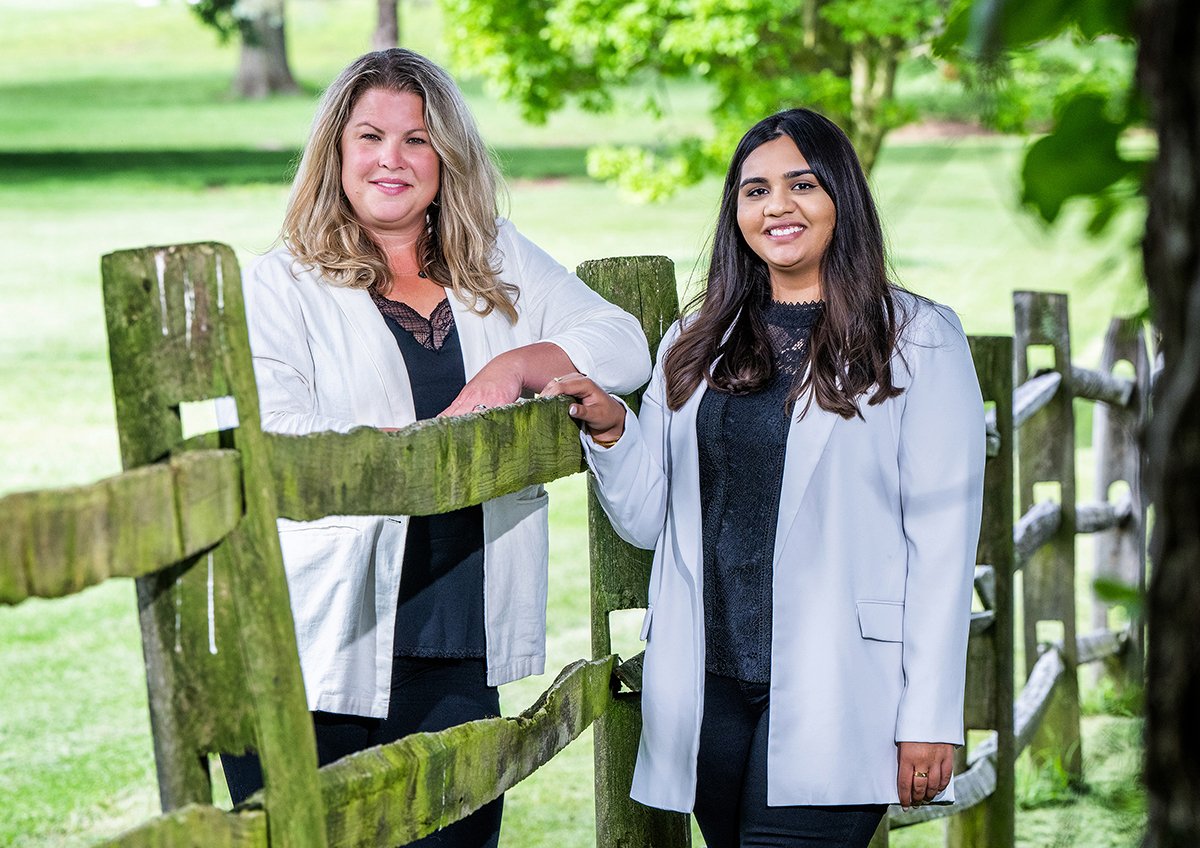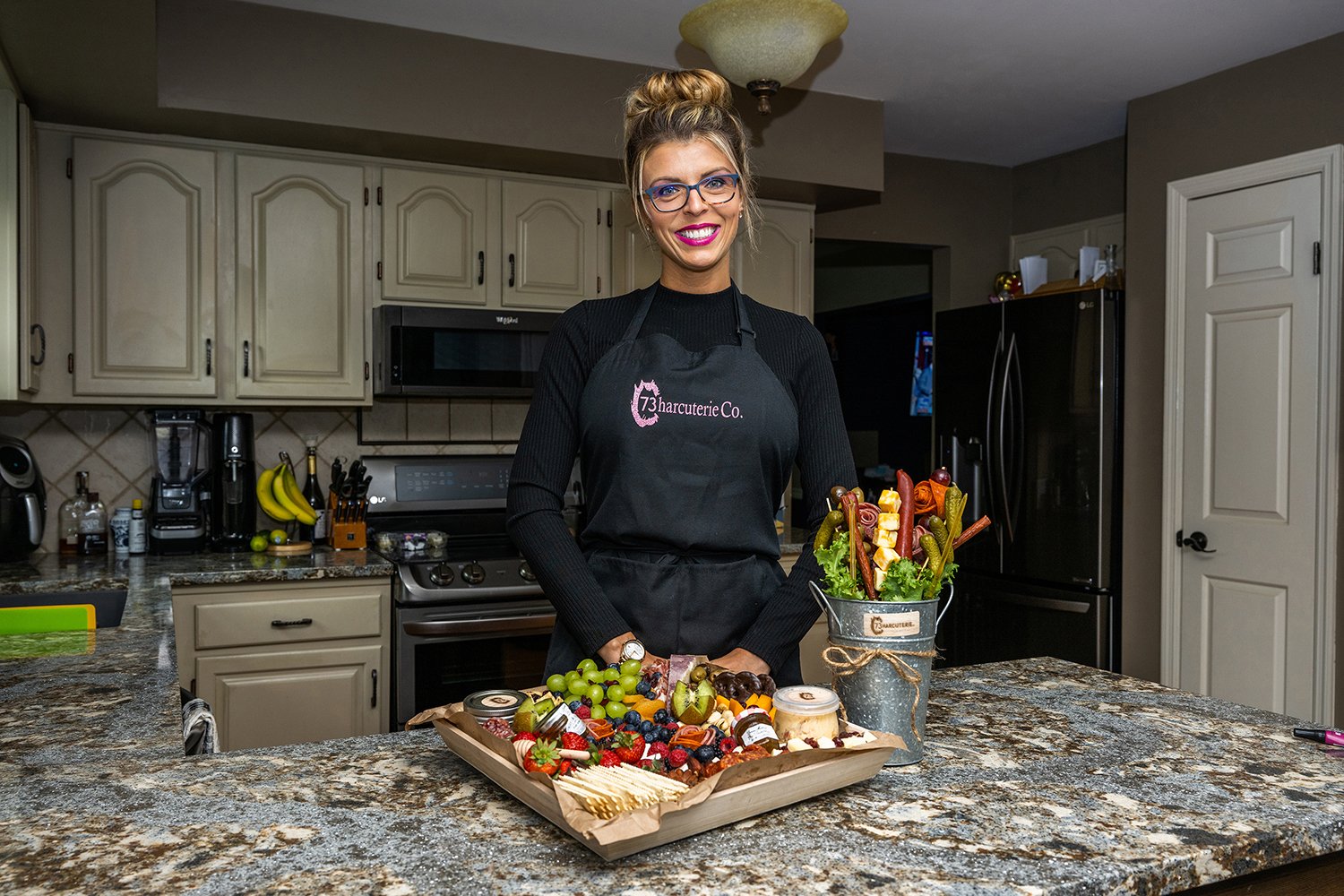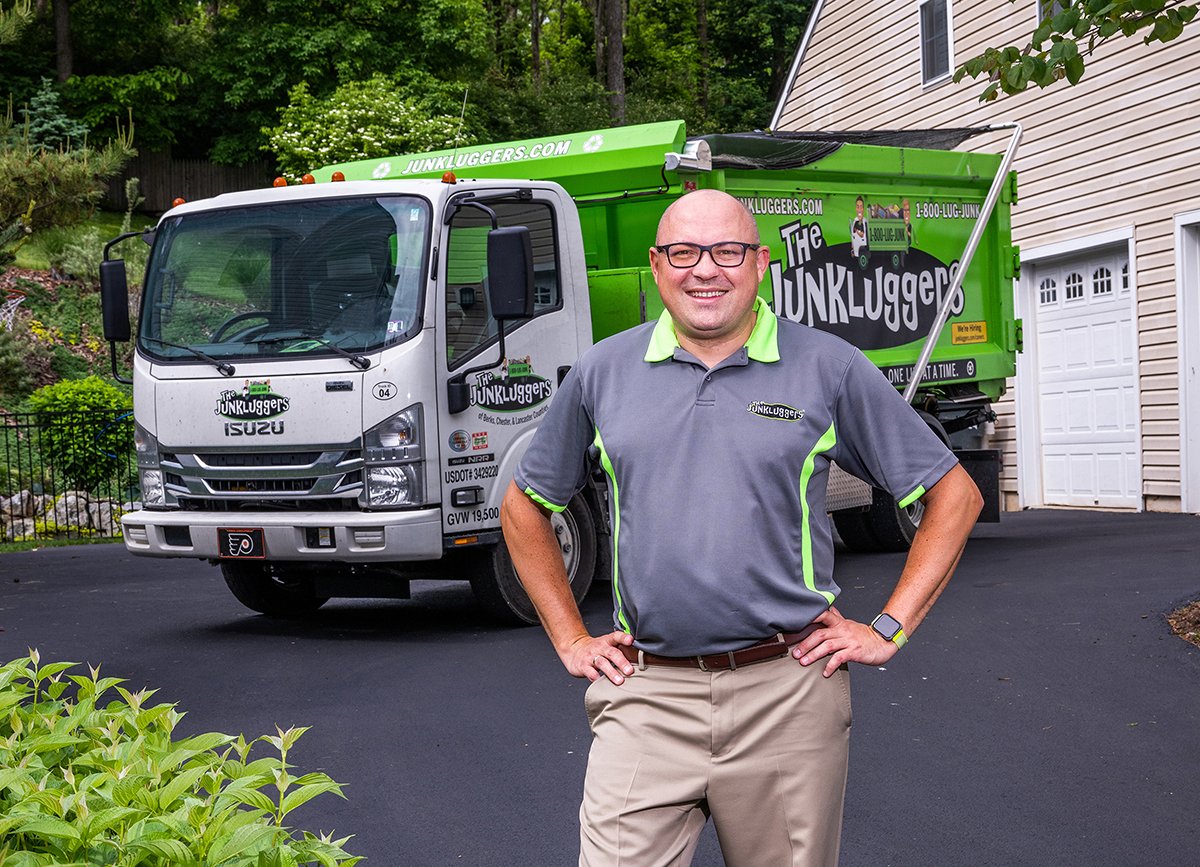Starting a business can be incredibly stressful, even in the best of circumstances. Making the leap during a once-in-a-century global pandemic is another thing entirely. Yet many Americans found opportunity in adversity. Among them are four Berks County entrepreneurs who, whether through choice or necessity, used the COVID-19 pandemic to pivot into new careers.
To bee or not to bee. That wasn’t much of a question for Branden Moyer. It was more of a need.
After returning from a yearslong stint in Florida working for The Walt Disney Company, the Governor Mifflin grad returned home to start a cleaning company using the knowledge and experience he gained housecleaning at the Happiest Place on Earth. The resultant company, Homecare Solutions, was going strong. And then the unthinkable happened.
“It was May 17, 2020,” Moyer says. “I remember the day just like yesterday. I went from 19 employees down to two.”
A year earlier, Moyer shadowed a friend who was a small-time beekeeper and fell in love with the profession. Once it became apparent that the COVID shutdown was going to last longer than two weeks, he buzzed into action.
“We were shut down for four months, and that gave me ample time to use the money the government was giving us to invest in something that could possibly produce another income,” says Moyer, 33. “And beekeeping was that.”
Uncle B’s Honey Company is based in Kenhorst, where the business manages over a dozen hives and where Moyer serves on borough council. Its product can also be found at the Shillington Farmers Market and at the DoubleTree by Hilton hotel in downtown Reading.
And Moyer has grand plans to take his initiative countywide with the help of Pollinating Penn. The nonprofit contracts Moyer to help take care of its hives and provide tours of the colonies on the roof of the DoubleTree.
“Our goal is to make downtown Reading the bee capital of Pennsylvania,” says Moyer, who swears by the efficacy of apitherapy, or bee-venom therapy, after an accidental sting helped him regain feeling in his thigh for the first time in a decade.
He also published The Adventures of Uncle B and Ruby Catching a Swarm, the first in a planned series of children’s books that aim to teach the youth about the benefits of using honey in place of sugar and about the importance of its producers.
“Bees were just categorized as the single most important living creature in the world,” he says. “They are the reason why we have fruits and vegetables. They’re the ones who pollinate 70 percent of the crops that we need to sustain ourselves.”
It’s nothing to sneeze at – literally. Local honey can also help alleviate allergies.
“Within 20 to 30 miles of where you live, that is the honey you ought to eat,” he says. “Anything outside of that, the types of pollen really aren’t affecting you. They’re different profiles. You want to make sure you consume the right profile so you can build up a tolerance.”
Moyer remains involved with Homecare Solutions, but he hopes to ramp up that business to the point where it’s self-sufficient so he can sell it or have other people run it for him. Then he can devote all of his time to the bees’ needs.
Moyer offers tours at his Kenhorst property and recently launched the master class “Beekeeping for Beginners,” providing a more detailed instructional view of raising bees, allowing attendees the opportunity to go inside the hive.
“My all-time goal is to buy a big property, buy one of those trains you see at Knoebels, and tour people around the property explaining the bees,” he says. “And then at the end, just like Disney, you’ll exit through a gift shop.”

Tricia Williams—Social Clover Marketing
Not only was Social Clover Marketing started during the pandemic, it was started because of it.
Longtime marketer Tricia Williams noticed that COVID dramatically altered the way people did business. With in-person interaction eliminated seemingly overnight, businesses realized they needed a new strategy to reach customers in the online world.
Williams gained plenty of experience in that arena through her first business adventure, Cairn Collective. Founded in 2017, the eCommerce and retail business sold jewelry and apparel, mainly through the use of social media, making her well-positioned to help businesses adapt to the new normal.
“The pandemic was really a silver lining for us because we had this great opportunity to do what we already knew how to do,” says Williams, 41. “A lot of business owners multitask. This allows them to say, ‘Okay, you can handle this part, and I can focus on higher-level and more important items and know that this was taken care of.’ Basically, we become an extension of the team, helping them get their messaging out and achieve growth through creative marketing efforts. We’re able to offer a streamlined process that frees up a ton of their time that they didn’t even realize they were missing.” Those efforts include advertising, social media, marketing strategy and search-engine optimization.
The four-leaf clover is a fitting logo as Social Clover has had plenty of good luck since launching in May 2020.
“We have grown exponentially within two years,” Williams says. “I was able to onboard a great employee, Samihah Ali. I had her as an intern, and she was just fantastic, so I was able to offer her a position with the company. She’s basically my right-hand girl and brings fresh ideas to the table. We definitely have plans for growth, but it’s just the two of us now.”
Though the company is based in Sinking Spring, its employees spend much of their time out of the office traveling to clients’ sites for photo shoots, one-on-one consultations and whatever else they need.
“It’s completely case-by-case; that’s the beauty of it,” Williams says. “We are a small company who listens to our customers’ needs, working with them to figure out a plan specifically tailored for them.”
The growth in Social Clover allowed Williams to sell Cairn Collective. Its new owner will continue to partner with a global nonprofit, planting a tree for every item sold.
So, while her old business continues to grow trees, Williams hopes her new one will continue to grow in size.
“Right now we have a really, really good group of clients,” she says. “My goal would be to be able to have a full-time staff of anywhere from three to five employees within the next five years.”
Visit socialclovermarketing.com.

Erika Lebo—73 Charcuterie
Erika Lebo was a pro in the food-service industry.
Her 20 years of experience included everything from working in restaurants to handling food distribution. But it wasn’t enough to protect the ServSafe-certified veteran from the ripple effects of the persistent pandemic, and she lost her job in January.
While discussing what might come next, her husband suggested a charcuterie business since they were always making them for their parties.
“So, I went online and looked them up and literally that same night created a Facebook page and ran with it,” Lebo says. “It’s completely taken off.”
73 Charcuterie – the number represents Lebo’s initials flipped upside down – offers ready-to-eat charcuterie in different sized boards along with grazing tables. Lebo also teaches classes at sites including Ridgewood Winery in Cumru Township, Exeter and Kutztown community libraries, Folino Estate in Kutztown and in clients’ homes.
Starting a business offering products that require patrons to stand around a board sharing small servings of food is not ideal during a pandemic, to say the least. But Lebo found a solution by getting creative.
“People are a lot more germ-conscious now,” says Lebo, who operates the business alone, with occasional help from her husband and daughter. “So, we introduced charcuterie cups and boxes so everything’s already individually portioned. If someone’s not comfortable having that shareable aspect of it, they can have their own portion without sharing germs.”
Interested parties can order everything through the Exeter Township-based company’s website, 73charcuterieco.com. Lebo says she can accommodate most dietary restrictions.
So, what makes a good charcuterie board?
“There is a lot of thought that goes into a board and trying to hit everyone’s different tastes,” says Lebo, 40. “You have to have an assortment of sweet and salty. You have to have different textures, something creamy, something that’s a little firmer. For your crackers, you want a dry, crispy cracker. Buttery ones absorb flavors and moisture. And you don’t want to make a board with a picture in your head, because it will never turn out the way you picture it – ever. Just let it flow as you’re making it.”
Earlier this year, Lebo received publicity most can only dream of when she and her partner won $5,000 on You Bet Your Life with Jay Leno, a reboot of the Groucho Marx game show. But despite that brief moment in the national spotlight, she’s content to grow 73 Charcuterie organically.
“Short term, I just want to continue to build our brand, because right now we’re known in Exeter and that’s about it,” she says. “And I’d also like to have an event space where people can come and have an upscale event with our grazing table as the center focus. Ultimately, the goal is to have a physical location where we can offer our charcuterie boards all the time. People can just kind of do a grab-and-go.”
Visit 73charcuterieco.com.

Jakub Mochon—The Junkluggers of Berks, Chester & Lancaster
Fed up with the corporate world, Jakub Mochon sought a clean break.
Instead, he found junk.
In 2020, the Sinking Spring resident brought the Junkluggers franchise to Berks, Chester and Lancaster counties. The national company differs from its competition by focusing on sustainability, not merely hauling away unwanted items, but donating, repurposing or recycling them wherever possible.
“We live in this consumer society where everybody buys stuff and no one thinks what will happen with it,” Mochon says. “It’s amazing how often they are overwhelmed by it. I’m not even talking about a hoarder situation. I’m just talking about people who have stuff in the attic or the basement, now it needs to be gone, and they’re like, ‘What do I do with it?’”
Owning a junk-removal business may not be as exciting as owning a Subway or a gym, Mochon says, but it’s necessary. And what gets him most excited about it is the process he calls the triple win: the company makes its customers happy by removing unwanted items from their houses, it makes donation centers happy by giving them quality items they otherwise wouldn’t have, and it makes donation-center shoppers happy by expanding the stores’ offerings. It even provides donation receipts to customers if something winds up with one of its partners.
All of the work is done by teams of two; Mochon likes to recruit young people who are seeking something interesting and different.
“A good month for us is 100 to 150 appointments,” says Mochon, 47. “Some of our appointments are gigantic. We’ve had jobs where we removed like 20 trucks’ worth of stuff. But the majority of them are like: ‘Hey, I’m getting a new couch, and the old one has to go. Take it away.’”
The Junkluggers of Berks, Chester & Lancaster officially opened on June 1, 2020. At the time, the franchise’s entire area of operation was considered at high risk for COVID spread. So, Mochon took precautions, making sure all of his workers had masks and protective equipment, and maintaining the same worker pairings to try to contain any potential outbreak. Not only did those measures help protect his team, it also landed him some customers.
“There were plenty of situations in which somebody told us they chose us because our guys showed up wearing masks,” he says.
Mochon started with one truck, and he would often tag along to lug the junk. Today, he has five trucks and 11 employees. And he wants those numbers to continue to grow.
“We want to achieve $1 million in sales this year, which when you think about it for a business that started during COVID, our second full year is going to be our first million-dollar year,” he says. “Long-term we want to add more teams, more trucks, and hopefully in five years we have 15 trucks covering this area.”
Visit junkluggers.com.
















